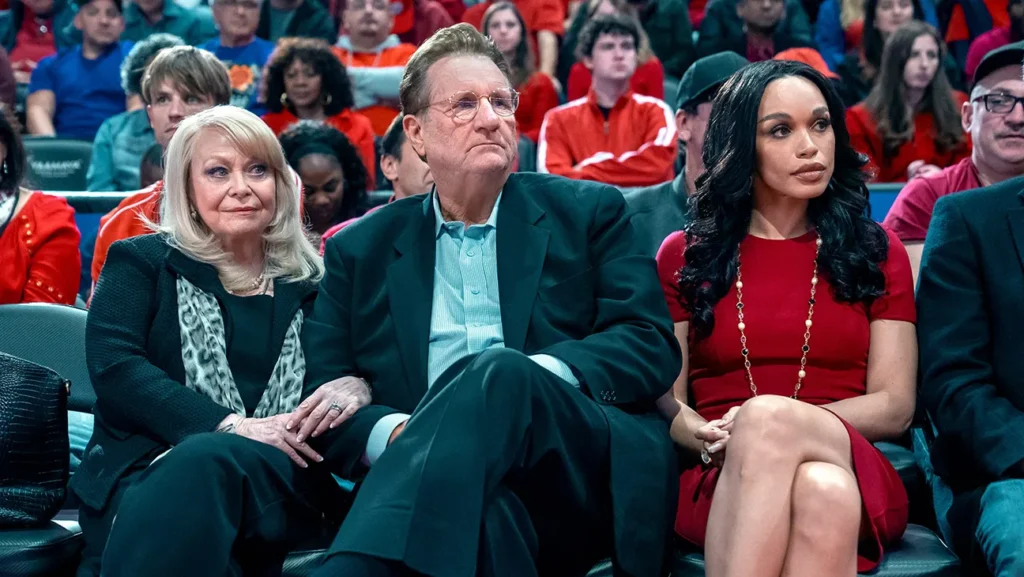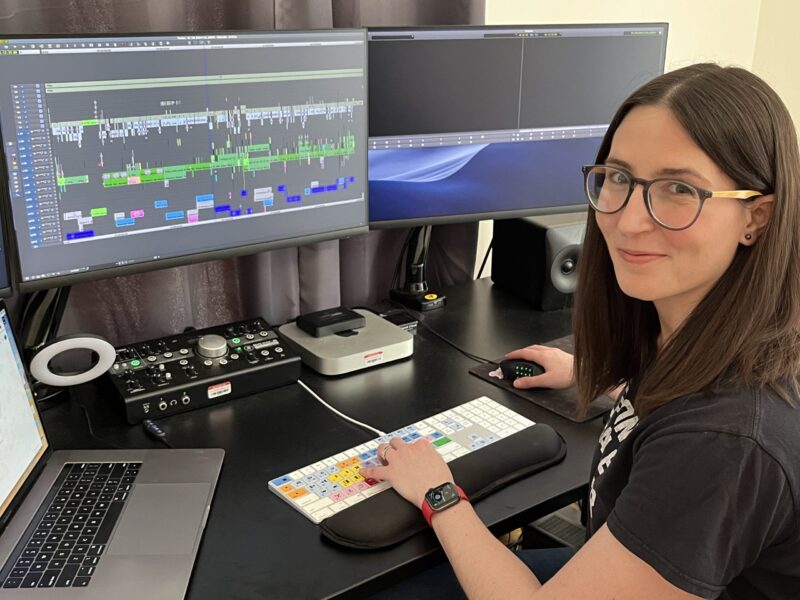By Patrick Z. McGavin
Susana Benaim has built an impressively varied career.
Upon arriving in Hollywood, the Venezuelan-born picture editor parlayed an ACE internship into a professional launching pad.
Benaim has since cut episodes of Netflix’s “Self Made: Inspired by the Life of Madam C.J. Walker” (2020), Hulu’s “The Dropout” (2022), and the Disney Channel’s “National Treasure: Edge of History” (2023).
She has most recently cut the pilot and three episodes of “Clipped,” the FX on Hulu six-part limited series about the racially charged scandal involving Donald Sterling, the controversial former owner of the NBA’s Los Angeles Clippers.
CineMontage caught up with Benaim to discuss the project, and her career in general.
CineMontage: How did you make the leap from growing up in Caracas to become a picture editor in Hollywood?
Susana Benaim: My dad had a production company in Venezuela that produced late-night talk shows. I grew up around production. He brought me to the station. At some point, when I was 13 years old, just for fun, I found myself playing with editing software. It came for free on one of those Sony computers, and it was pretty rudimentary. After years of seeing me play and struggle on this machine, he realized it was more than just a hobby.
I believe I was about 15 when my dad finally brought me one of the editors, sat me down, and said, “Just learn.”
I commend him, because that’s how you learn as a professional in this industry. I went to school in the United States, at Syracuse. The school is very good about giving you a well-rounded education. I took a lot of classes on production and scriptwriting. I ended up editing the other students’ work because nobody else wanted to.
When I was finishing school, my college mentor insisted I should try coming to Los Angeles. I wasn’t originally planning it. If you grew up abroad, that was such a far-fetched idea: to make it in Hollywood, and accomplish your dream. He really believed I could make it in Los Angeles with the greater opportunities. I moved here with a couple of friends from college, and I gave myself a year. Within the first month, I got a paying job on post for a reality television show.
CineMontage: How influential was the ACE internship you took part in?
Susana Benaim: It completely changed the course of my life. I was applying for things when I first got to Los Angeles. I never heard of it. At Syracuse, writing and producing are the two main careers, and it was not commonplace to know it there. You’d also never hear about this program in Venezuela.
I applied not knowing much about it, but I found somebody who went through the program. He used these really big adjectives to describe the program. I knew it was a big deal. I got the interview, and then the internship and everything just skyrocketed from there. I can trace a lot of where I am today because of that program, and the mentorship I received and the people who recommended me for things.
The rest is history. Someone I ended up meeting through the program, Hunter M. Via, I just shadowed him back then. I assisted him for a couple of years, and he was the one who helped me get bumped up to editing.
CineMontage: Is there something about editing that is attuned to your sensibility?
Susana Benjamin: Absolutely. I really enjoy working in collaboration with one or two people. My dad was a producer, but I have family members who are psychologists. I grew up with a lot of openness about psychology and behavior, and I find that such a huge part of what we do.
To be honest, I’m not very technically savvy. The tools you can always learn. I always try to get my assistants to always teach me things. It’s really less about knowing everything about all the tools you’re working with and more about being adaptable and being a quick thinker when it comes to story and problem solving. That’s more important than doing something quickly on a keyboard.
CineMontage: How did you get involved with “Clipped”?
Susana Benaim: It’s actually kind of a strange story because I got a call from Francesca Gregorini, a director I’d worked with on “The Dropout.” We were in talks to do her feature film, “Hurricanna” (2024). She booked Episodes Three and Five of this show. Francesca really liked the scripts, and she wanted me to get on it as well.

Ed O’Neill, with Jacki Weaver (left) and Cleopatra Coleman, in “Clipped.” PHOTO: FX/Hulu.
She was a fierce advocate. I met the showrunner, Gina Welch, and the producing director, Kevin Bray. We talked about tone. I was actually about to go on my honeymoon in Namibia, with my husband. When they were doing the table reads, I Zoomed in from Africa to listen to those. That’s how wild and quick it all was.
CineMontage: “Clipped” touches on all of these provocative themes—race, sex, class, sports. How did that impact your work?
Susana Benaim: I feel like the show is something of a soap opera. It begins like a department-store scandal with the mistress and the wife, and that snowballs into this much bigger thing.
The questions about power and race in America were very much at the forefront of the story we wanted to tell as much as we wanted it to be entertaining. The threads we create of America, Black players, and systemic racism in the NBA was specifically a snapshot of something much greater than what we were showing.
CineMontage: What begins as something fairly self-contained is amplified in unprecedented ways by social media.
Susana Benaim: One of the things we wanted to showcase was how people reacted to things and whether that was going to be part of the storytelling. I felt like the scripts were beautifully written, but they were straightforward. The sense of how the Internet and media reacted, that was all something we came up with in the edit.
We wanted to try and find some stylistic transitional tissue for the show. That came about mostly because Gina and I kept having conversations about how this story became viral because of social media. Otherwise, it never would have gotten the traction it did. Because the characters are so wacky, they were perfect for the memes and tweets of the time.
One morning, Gina and I, trying to figure out how to bring in how the audience interacted with the story, we came up with the “scrolls.” It was a big undertaking in the end because we had to source and license a lot of the material. It had to be something reacting to what was going on at the time.
It had to be true to the moment, and of the scandal. The whole post team jumped on board because it became something very special to all of us in adding momentum, but also comedy and poignancy because of how people were reacting.
CineMontage: Taking a figure like Donald Sterling (Ed O’Neill), he’s admittedly great theater, but also someone who’s expressed some pretty loathsome views with his racism and sexism. How did you maintain the factual accuracy but also make the storytelling engaging?
Susana Benaim: In terms of Donald Sterling and really every character in the show, you can only take the pieces that are public knowledge and go from there. With the research and talking to the players and (Clippers’ coach) Doc Rivers, I think Gina had a really good understanding in the scripts of who each character was, and then filled in the blanks with levels of humanity. For instance, the character of V. Stiviano, I find her to be an enigma when you look at her public persona, she’s a very strange person.
I think what was written and what the actress Cleopatra Coleman brought to that character gave a whole new layer of humanity. You feel for her in a strange way, and you root for her. She’s not necessarily a likable person, but she’s someone that you want to see succeed. On the opposite side of the spectrum, Donald Sterling is one character we are never going to find any humanity. He has a speech in Episode Five where he talks about power, and how things are and always have been, and he is part of that system. It’s always been this particular way, and he didn’t do anything wrong. That’s probably his most human moment.
CineMontage: How would you describe your ideas or theories about cutting actors and shaping performance?
Susana Benaim: I think personally I just react to the footage as it comes. My experience has taught me just to respond to performance first, and that informs my cutting style.
With this show, we had to tweak a lot in terms of the tone because had to balance some comedy and awkwardness with the dramatic moments. The moments, for instance, between Donald Sterling and Doc Rivers, a lot of it was awkward and uncomfortable, but also kind of funny.
We had to go back and forth and try to find that as we moved forward with the process. Any show, in terms of tone, you’re finding it from what you received. In your head, before you even receive anything, you can say, “I think it needs to be propulsive.” We talked about it needing to be propulsive, and then you have to figure out a way to make that happen from the footage you receive. For “Clipped,” we talked about it needing to be propulsive and also fun, and also have that awkwardness.
You have these great performances, and you have to balance that and have that inform how you create the pacing, and the moments where you want to work in close-up.
CineMontage: Do you have a particular technique that has evolved during your career?
Susana Benaim: What I do with every show is work with my assistant prior to each day of dailies. We sit down and talk about the footage that’s coming the next day. We talk a lot about what we call emotional anchors. Whose scene is it?, or why is it emotionally this character’s scene versus the other person’s?
You sort of emotionally prepare what you have to accomplish with the scene more than the tone and pace. I really need to set this scene emotionally, and that is my North Star with everything I receive. Tone and style is informed by that because emotion is king is what we do.
If you’re not getting any sort of emotion—whether it’s anger, frustration or a laugh out of it—I’m not doing what I’m supposed to be doing.
Patrick Z. McGavin is a Chicago-based writer and cultural journalist. He writes on film at www.patrickzmcgavin.substack.com


